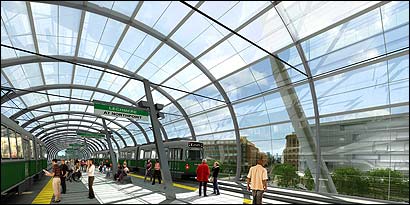There was an article in the Globe today discussing the station's name and whether it should be changed or not.
Familiar name comes under question
Findings leave city councilors wondering whether they should preserve Lechmere's name on the Cambridge T station
By Janice O'Leary, Globe Correspondent | November 12, 2006
It's so us.
Lechmere T Station. Lechmere Square. Lechmere the store that sold washing machines and toasters to generations of Boston-area families. Lechmere the name that's as familiar as a plate of scrod to natives, but that newcomers have to learn to pronounce (leech-meer).
Who knew that the Richard Lechmere who started it all was a distiller of rum, a slave owner, and a Loyalist who rued the slide in his property values at the start of the Revolutionary War and referred to the rebels as "wicked and deluded people"?
Last month Cambridge city councilors passed a resolution urging the MBTA to keep the connection between the T station, the Revolutionary War, and Richard Lechmere's name.
But now City Councilor Denise Simmons, who didn't know at the time that Lechmere was a slave owner, wishes she could take it back. "Having that additional knowledge now, I don't support it being named after Lechmere," she said.
"Going into the future, we wanted to hold on to some piece of the past," she said. "I'm now troubled. But the vote's been taken. If I could take my vote back, I would."
City Councilor Henrietta Davis said she hadn't known all the details of Lechmere's legacy when she and Vice Mayor Timothy J. Toomey proposed the order. "We wanted to keep the historic connections to the area," she said. "We didn't know about the slave ownership."
Work began last month on a new MBTA station in the nascent NorthPoint neighborhood. When it opens around 2010, it will replace the Lechmere stop on the Green Line, but debate over its naming is already raging. Tentatively, it's slated to be called Lechmere at NorthPoint, but NorthPoint's developers hope that the Lechmere tag will fall off.
Davis said the outing of Lechmere as a slave owner doesn't alter her stance that the T stop not be named for a new commercial endeavor. "I still want to keep a connection to history," she said. "There's something to be said for preserving history but not elevating the man."
Lechmere's slave ownership is documented in an early legal case, James v. Lechmere, argued by Harvard graduate and fellow Loyalist Jonathan Sewall. In 1769, a slave named James sued Lechmere for his freedom. Sewall argued that under the colony's charter any man born or residing in the colony was free. The case was resolved before it could go to trial: Lechmere gave James his freedom and tossed in 2 pounds sterling.
"Maybe we should name the T stop after the slave," said Cambridge City Councilor Anthony Galluccio when he heard the story, and his colleague Denise Simmons agreed. "Let's call it James Station," she said. "There are so many other people we could name it after."
"Most important," said Galluccio of the naming issue, "is that the decision be left up to the neighborhood and broader Cambridge community. Our biggest challenge here is to be sure NorthPoint is integrated with the rest of East Cambridge."
He said neighborhood residents are feeling a bit overtaken by the new development and the council doesn't want to see that happen.
"When I think of Lechmere," Galluccio said, "I think of Lechmere Station."
The article is much longer. The rest and a short slideshow on Lechmere can be found here
http://www.boston.com/news/local/articles/2006/11/12/familiar_name_comes_under_question?mode=PF

